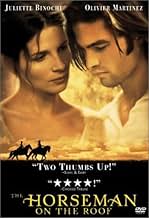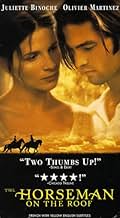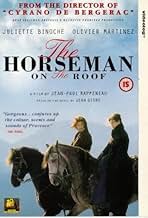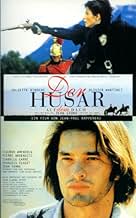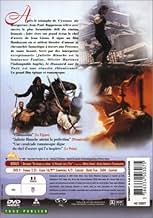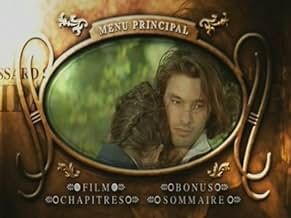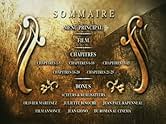IMDb RATING
7.0/10
6.6K
YOUR RATING
In a time of war and disease, a young officer gallantly tries to help a young woman find her husband.In a time of war and disease, a young officer gallantly tries to help a young woman find her husband.In a time of war and disease, a young officer gallantly tries to help a young woman find her husband.
- Awards
- 4 wins & 8 nominations total
7.06.6K
1
2
3
4
5
6
7
8
9
10
Featured reviews
A ride through Provence
Two superstars of the french cinema: adorable Juliette Binoche and hot Olivier Martinez, love and save each other from lost, sickness and death, while horse-riding through the stunningly beautiful Provence. An adaptation of the famous novel by Jean Giono. They are there: on the screen, on their horses, in this magnificent landscape, he tries to become a man, she tries to stay a woman, they are smiling, and soon you'll express the wish of being with them on this screen, to be one of them, maybe both, if this happens, Rappeneau gets to his goal: grace. A great tale about love, renouncement, youth, passion, courage and Honor. A famous novel of the french literature. Patriotism, romanticism, and grace. Rappeneau is the master, Binoche and Martinez are the gifted pupils.
A noble effort...
It takes quite an amazing group of people to make a great epic. Aside from great source material, really all the components have to be superb, and it has to be put together in such a way that the viewer is not left wondering what happened to a decade (see: Queen Margot).
Most of the necessary pieces are here, but there is something missing, some element that keeps it from being a truly great film. It is certainly a good one, a movie that is worth seeing, and worth doing so on a big screen, thanks to its beautiful scenery between France and Italy. The stars are very watchable, and the story is tight enough to keep your attention throughout. Unlike many films of its genre, it is not overlong.
Ironically, I found myself comparing it to another Binoche epic, The English Patient, which made me wonder what was lacking in light of what I consider to be a finer film. In the end, it may be simply that the latter had a novel that was more compelling, or a lead (Fiennes) that was just more riveting.
The story is of two people fleeing the outbreak of cholera in early 19th century France. Angelo is attempting to return to his native Italy, to join the revolution, and Pauline is searching for something... They manage to aid each other's flight.
In the great tradition of French period epics, this is not the pinnacle, but it is near the upper echelon. It's worth a shot.
Most of the necessary pieces are here, but there is something missing, some element that keeps it from being a truly great film. It is certainly a good one, a movie that is worth seeing, and worth doing so on a big screen, thanks to its beautiful scenery between France and Italy. The stars are very watchable, and the story is tight enough to keep your attention throughout. Unlike many films of its genre, it is not overlong.
Ironically, I found myself comparing it to another Binoche epic, The English Patient, which made me wonder what was lacking in light of what I consider to be a finer film. In the end, it may be simply that the latter had a novel that was more compelling, or a lead (Fiennes) that was just more riveting.
The story is of two people fleeing the outbreak of cholera in early 19th century France. Angelo is attempting to return to his native Italy, to join the revolution, and Pauline is searching for something... They manage to aid each other's flight.
In the great tradition of French period epics, this is not the pinnacle, but it is near the upper echelon. It's worth a shot.
A dashing romantic drama with thrilling moments.
Provence provides a stunning locale for this romantic adventure. The camera work is exquisite and every opportunity is taken to capture the natural beauty of this region. The story is simple enough. Angelo, an Italian colonel (handsome Olivier Martinez) escapes from Austrian-oppressed Italy to raise funds in the continuing battle against Austria. He finds more than an unsympathetic acceptance in France. Most of the towns through which he rides are beset with cholera. The camera scenes of the dead and dying victims, horse-drawn carts packed high with bodies and funeral pyres are terrifying enough, but it is the fluttering of black wings as crows seek out the eyes of the dying victims that frighten most. Some of the close-ups are pretty grim. In lighter vein I liked the scene where a cat befriends our horseman and he talks to it on the roof about how wars are won with money as much as guns. The cat is a great little actor. The horseman an accomplished swordsman carves his way through many a desperate situation (What hero doesn't?) He acquires a bottle of medicine from a dying stranger who has taught him a massage technique to avert death from cholera. On his way back to Italy with a bag of gold coins, he gives protection to Pauline, a doctor's wife (Juliette Binoche)who is seeking out her missing husband in the cholera-infected area. The young 25-year old colonel who sends almost daily letters to his mother in Italy (they are really a diary of events) behaves as the perfect gentleman at all times, but his protegee is obviously drawn to him. Here is a love story where the lovers admire from a distance never submitting to the chemistry which is drawing them together. When the woman collapses with cholera, all existing barriers are forgotten as he works on her frantically with his acquired knowledge to save her life. One of the great joys of this film is to watch the handsome faces of Martinez and Binoche. Their beauty contrasts sharply with the agonised plight of the villagers and the devilish black crows which hover continuously about the dead, fluttering out through open doors and windows. The ending may not satisfy some, but it leaves us with the thought that somewhere sometime all will be well again.
excellent adventure
This is a 19th century story that is strongly reminiscent of a "knight in shining armor" story of long, long ago. The handsome hero is both committed to his cause of freeing Italy from Austrian rule AND protecting his lady from all harm--even when she stupidly blunders into it on a couple occasions. From start to finish, this is an excellent historical "chick flick" and is likely to excite the passions of many female viewers, but I am a guy (at least the last time I checked) and I STILL enjoyed it. The acting was excellent and the cinematography outstanding. About the only minor problem with the film was the occasional stupid behaviors by the female lead (Binoche). A couple times, she just seemed too stupid to live--but, of course, the handsome hero came to her rescue.
An excellent film, but a little disturbing due to its graphic depiction of plague victims. Plus, with a little nudity towards the end of the film (it was explicit but not gratuitous), this is NOT a film for the kids.
An excellent film, but a little disturbing due to its graphic depiction of plague victims. Plus, with a little nudity towards the end of the film (it was explicit but not gratuitous), this is NOT a film for the kids.
10janusz-2
Focus is genius.
I found this film to be excellent. Though I am a student of history, I really do not know all the details regarding this episode of the freeing of Italy from Austrian authoritarianism. Though interesting, the historical aspect of the movie was not that important to me. It was a highly enjoyable adventure film that could have been placed in lots of different historical times.
Besides being a great adventure film it masterfully dealt with a most wide range of emotions. There were many undertones and harmonics dealing with fear, desperation, horror, escape, passion, love, honor and divine, or natural, justice.
What was so fascinating to me was how the movie showed the power of freedom, courage and focus. The protagonist was raised by his mother (a most curiously powerful presence in this movie even though we never see or hear her)to be independent and freedom loving and this movie shows how strong and almost invincible this makes him because he believes it and lives it with all his heart. All around him the world is literally falling apart and going mad from fear and disease and yet, by neither railing against it nor taking on these thoughts, he triumphs with his will to live and being true to his own vision at all times.
And as an added bonus, the visual artistry of this movie, from the titles all the way to the end is beautiful to behold. The scenery, costumes, sets, actors, camera angles and etc. are all brilliantly satisfying. The movie was a joy to see.
Besides being a great adventure film it masterfully dealt with a most wide range of emotions. There were many undertones and harmonics dealing with fear, desperation, horror, escape, passion, love, honor and divine, or natural, justice.
What was so fascinating to me was how the movie showed the power of freedom, courage and focus. The protagonist was raised by his mother (a most curiously powerful presence in this movie even though we never see or hear her)to be independent and freedom loving and this movie shows how strong and almost invincible this makes him because he believes it and lives it with all his heart. All around him the world is literally falling apart and going mad from fear and disease and yet, by neither railing against it nor taking on these thoughts, he triumphs with his will to live and being true to his own vision at all times.
And as an added bonus, the visual artistry of this movie, from the titles all the way to the end is beautiful to behold. The scenery, costumes, sets, actors, camera angles and etc. are all brilliantly satisfying. The movie was a joy to see.
Did you know
- TriviaShot over a period of four and a half months in 50 different locations.
- Alternate versionsThe version released in the U.S. was significantly shorter than the original French version, because the American distributor removed 15-20 minutes of footage.
- How long is The Horseman on the Roof?Powered by Alexa
Details
- Release date
- Country of origin
- Official site
- Languages
- Also known as
- Damdaki süvari
- Filming locations
- Menthon-Saint-Bernard, Haute-Savoie, France(final castle scene)
- Production companies
- See more company credits at IMDbPro
Box office
- Gross US & Canada
- $1,320,043
- Gross worldwide
- $1,320,043
- Runtime
- 1h 58m(118 min)
- Color
- Sound mix
- Aspect ratio
- 2.35 : 1
Contribute to this page
Suggest an edit or add missing content


